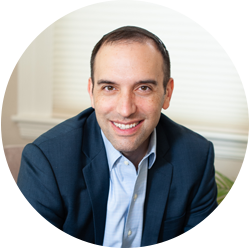
Shalom Chaverim,
Earlier this week, CJP hosted our third annual Read On event, featuring Dara Horn, author of Eternal Life, the book that many across our community have been reading throughout the year. An added dimension of this year’s event was a new partnership with our Women’s Philanthropy community —WORDS: Women Organizing, Reading, Discussing, Socializing. WORDS illustrates how CJP volunteers and our Boston Jewish community are evolving traditional models of community-building and infusing them with new, meaningful content and Jewish learning.
I read Eternal Life earlier this year, a work of historical fiction about a matriarch who lives for 2,000 years as the result of a bargain she makes to save the life of her child. It explores themes of life and death, love, loss, family, and more. As we approach the upcoming Passover holiday, I am struck by Horn’s fascination with time and the Jewish tradition, which she describes in an interview for JewishBoston.com:
In American culture, we’re always looking forward and anticipating the future. We’re not supposed to care about what happened in the past. As Americans we’re taught it doesn’t matter where we came from. What matters is what you do with the opportunities this country has given you. The premise of the American dream is the erasure of the past. In Judaism, it’s exactly the opposite notion. In every generation you’re supposed to see yourself as if you came out of Egypt. In rabbinic legend, the Torah given to us at Sinai was not only for those who were present to receive it, but their future descendants were standing at Sinai too. Judaism is about this commitment to the past and to meaning in the present.
I enjoyed reading the book knowing that others across the community were reading along with me. And, there was something particularly powerful about the public and communal nature of the event itself.
Horn, with a Ph.D. in Comparative Hebrew and Yiddish studies from Harvard, integrated complicated, nuanced Talmudic references into an incredibly accessible, light-hearted, and heartwarming conversation with my colleague, Rabbi Elyse Winick. This gave the audience a window into the mind and world of the author. She shared Yiddish stories and unpacked seemingly unimportant references in her book to expose a whole world behind her word choices.
With multiple layers of subtle references and allusions, the book is like a modern midrash, a classic form of commentary on canonical Jewish texts that weaves together reading, interpretation, and creativity. As one attendee of the event described to me, “Thanks to Horn’s vast knowledge of Jewish literature, it seemed like you could have ‘double-clicked’ on any line of her book and found multiple connections to classical Jewish texts and stories. It was learning at its best — you came to the event because of a compelling book and reading with friends, and you walked out with more knowledge than you started with.”
To me, Read On is more than an event, or even a yearlong experience. It is an ethos. I’m reminded of the famous teaching of the great Jewish sage, Hillel, who is asked to summarize all of Judaism: “What is hateful unto you do not do unto your fellow-person. The rest is commentary; go and learn.”
Many of us are familiar with the first half of this teaching, our ethical “golden rule.” But it is the second half that captures the spirit of the Jewish intellectual tradition. Hillel lowers barriers to and meets his student where the student is, on the condition that this is only the beginning. The vastness of Jewish tradition has a democratizing power because none of us will ever be done learning.
For many, especially adult learners, lack of knowledge can be an impediment to getting started. Hillel strives to lower that barrier by reminding us that a learned community is a learning community. Each of us can contribute to the building of learning communities and the creation of a vibrant Jewish future when we make the choice to read on.
Shabbat Shalom,
Rabbi Marc Baker
If you'd like to receive my biweekly messages by email, sign up here.

About the Author
CJP President and CEO Rabbi Marc Baker is an educator, writer, and leadership mentor who is devoting his life to Jewish learning and building Jewish communities.
